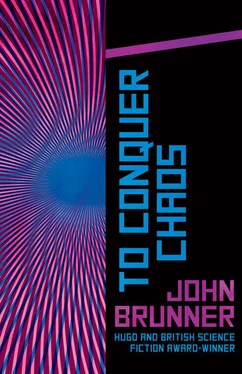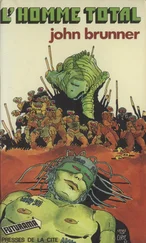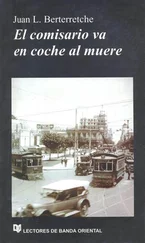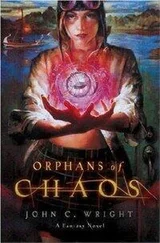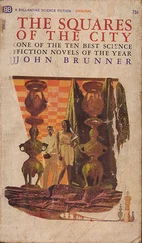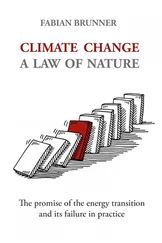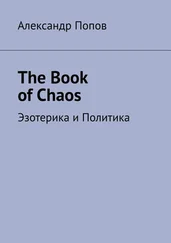John Brunner - To Conquer Chaos
Здесь есть возможность читать онлайн «John Brunner - To Conquer Chaos» весь текст электронной книги совершенно бесплатно (целиком полную версию без сокращений). В некоторых случаях можно слушать аудио, скачать через торрент в формате fb2 и присутствует краткое содержание. Год выпуска: 2011, ISBN: 2011, Издательство: E-Reads, Жанр: sf_postapocalyptic, на английском языке. Описание произведения, (предисловие) а так же отзывы посетителей доступны на портале библиотеки ЛибКат.
- Название:To Conquer Chaos
- Автор:
- Издательство:E-Reads
- Жанр:
- Год:2011
- ISBN:9780575101296
- Рейтинг книги:4 / 5. Голосов: 1
-
Избранное:Добавить в избранное
- Отзывы:
-
Ваша оценка:
- 80
- 1
- 2
- 3
- 4
- 5
To Conquer Chaos: краткое содержание, описание и аннотация
Предлагаем к чтению аннотацию, описание, краткое содержание или предисловие (зависит от того, что написал сам автор книги «To Conquer Chaos»). Если вы не нашли необходимую информацию о книге — напишите в комментариях, мы постараемся отыскать её.
To Conquer Chaos — читать онлайн бесплатно полную книгу (весь текст) целиком
Ниже представлен текст книги, разбитый по страницам. Система сохранения места последней прочитанной страницы, позволяет с удобством читать онлайн бесплатно книгу «To Conquer Chaos», без необходимости каждый раз заново искать на чём Вы остановились. Поставьте закладку, и сможете в любой момент перейти на страницу, на которой закончили чтение.
Интервал:
Закладка:
First: the nature of his visions, and Granny Jassy’s, and all others similar. They were not extraphysical recollections of the past. They were received messages, or signals.
And the burden of the message was simple: Help me!
In a time when the world was covered with cities of up to tens of millions of people, and not this world only but others, circling other stars, there had come a point at which the sheer numbers wishing to walk to other worlds-restless, bored with their long lives, hungry for the sights, sounds, sensations of alien environments-threatened to outstrip the capacity of the equipment handling the incredible traffic. The means used, in itself, was so complex it had always had to be managed at second-hand-not by individual persons, but by massive thinking machines. And the machines were inadequate.
Hence the development of the organochemic cortex: to all intents, a manufactured brain, with a personality, the gift of consciousness, all the discrimination of a human genius combined with the tireless reliability of an insensitive machine.
Such a cortex was installed at Terminal Station A, the largest centre for interstellar transport on the planet. From the three-mile dome arching above the Station it was possible to walk to any of a thousand distant worlds.
And back.
And from one such distant world somebody returned bearing in the cerebrospinal fluid of his body the virus of a disease named in the traditional lore of the Station as encephalosis dureri, which incubated and brought insanity.
No plague had ever before been transmitted on the scale of this one. Within days of the first outbreak it was on a hundred different worlds; within weeks, it had reached every planet known to mankind. As though one had emptied a bucket of sand into a precisely-tuned engine, the sophisticated complex of interstellar society ground to a halt.
Stripped of their sanity, people died-in accidents, in fires, by famine or explosion or a myriad other disasters. In the midst of primal chaos, the very few who were naturally immune stood as long as possible against the searing blast of the collapse, until they too were overwhelmed.
The ancestors of those now living at the centre of the barrenland had been a group of such natural immunes, sent to try and repair this largest of all interstellar transit points.
They started work under the impression that what had gone wrong was the simple consequence of a madman’s interference-some diseased mind among the Station’s human staff, they believed, had altered control settings or distorted the instructions given to the organochemic cortex. At that time, the cortex operated everything in the Station area: not just the actual process of transportation, but every service provided for the convenience of travellers.
The cortex knew better, and could not explain.
There was something so completely human about the despair Conrad had sensed that it had overcome him; it was as if he himself had been in the tormenting plight which the manufactured organochemic brain had endured uncounted times since the onset of the contagious madness. Which was to know that it was going insane, and to be able to do nothing about it.
The cortex was powered by the same source as the rest of the Station-the original emergency power supply, switched on to keep the cortex functioning after the disaster. When the stored power was low, as for instance after expenditure on the use of heatbeams, the cortex was practically unconscious. As the power built up again, its level of activity rose to a kind of incipient awareness. In this condition, it was sufficiently conscious to realise that when the power reached maximum the sleeping layers of its personality would arouse-and be insane because in the nutrient fluid bathing the entire artificial organism the viruses were still multiplying.
They were not like ordinary viruses. In some manner they made false connections between brain cells; the energy available at a synapse was a sort of stimulus to them. As it were, they caused innumerable short circuits and hence random patterns of response.
The effect on the cortex was to bring into operation an overload device intended primarily to limit the number of simultaneous traffic problems it was coping with. By that time it was no longer able to reason; it sought to expend energy and hurl itself into unconsciousness again for a period of recuperation.
And the way of expending energy which came most readily to the rescue was to initiate an interstellar transportation process.
From worlds once colonised by human beings, where now the native fauna roamed among ruins abandoned by disease-crazed savages, the insane artificial brain brought anything which blundered into a transportation terminal. It had just sufficient discrimination left, at this stage of its madness, to select for objects resembling its vanished human masters in mass-plus or minus a factor of about ten-and mobility.
The operation concluded, and signalled to the community of the Station here by an alarm which one of the immune technicians had rigged up after the very first such happening, the cortex relapsed into its torpid state.
And the cycle resumed, varying in length each time according to how much energy had been used up through other channels like the electrofences and heatbeams, which in turn naturally depended on the ferocity or docility of the thing from an alien planet snatched at by the desperate cortex.
Vegetation, too, had come through in the form of seeds or suckers transported with the animals, and not long after the original disaster had spread to form a jungle-like screen around the site of the cortex, into which unprotected men dared not venture, and which they dared not destroy randomly for fear of wrecking the cortex as well.
When perhaps as much as two centuries had gone by in this vicious circle, the cortex began to recover a little. Self-adjusting, it was able to cope to a limited extent with the harm the virus caused. By that time, however, the people trapped at the centre of the barrenland had suffered the loss of so much information and so many irreplaceable personnel that the best they could do was hold the ground they had gained; they could not advance.
What to do? The cortex was no longer equipped to communicate verbally-it had once been provided with vodors, but a massive monster had smashed the equipment as it stampeded from the arrival area.
Helpless, dumb, the cortex faced the recurrent cycle of insanity in full awareness, and the mere intensity of its longing for a return to the orderly past began to solve its problem.
This was where Conrad, even though he had experienced the actuality, began to lose his grip on the slippery concepts. It seemed, he thought, that there were-perhaps had always been-people slightly sensitive to the thoughts of others. At some time, somewhere, a person so gifted thought with longing of the happier past of which legends had survived, and responded to the neural currents-subliminally faint-generated by the organochemic cortex. Its maximum power consumption was on the machine level; its signals might be as strong as a radio’s.
Relaxed, in an autohypnotic state, someone like Granny Jassy or Conrad could tap the very thought-stream of the cortex in its lucid moments. Pictures of the past mingled with pictures of the present, but the present was hateful and discoloured by frustration, whereas the cortex was yearning for the past, and so little attention was paid to the available knowledge that people survived in the barrenland. Conrad had opened his mind to impressions of that sort only because he was thinking of growing up to kill devils like the one which had come to Lagwich, and had glimpsed Nestamay’s likeness and later dredged it from his subconscious; however, like most people, he abandoned pursuit of barrenland images and preferred to seek visions of the distant past.
Читать дальшеИнтервал:
Закладка:
Похожие книги на «To Conquer Chaos»
Представляем Вашему вниманию похожие книги на «To Conquer Chaos» списком для выбора. Мы отобрали схожую по названию и смыслу литературу в надежде предоставить читателям больше вариантов отыскать новые, интересные, ещё непрочитанные произведения.
Обсуждение, отзывы о книге «To Conquer Chaos» и просто собственные мнения читателей. Оставьте ваши комментарии, напишите, что Вы думаете о произведении, его смысле или главных героях. Укажите что конкретно понравилось, а что нет, и почему Вы так считаете.
